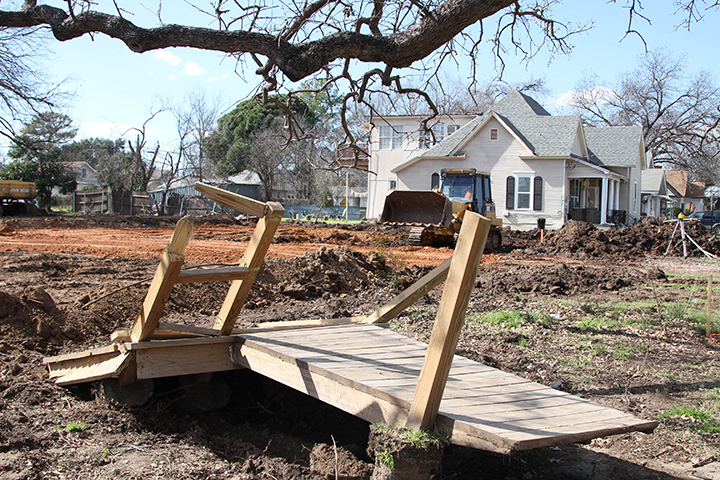
Hannah Haseloff | Lariat Photographer
By Rachel Leland
Staff Writer
The demolition of a state-designated historic home near Baylor may have violated the state’s government code, said Chris Florance, director of communications at the Texas Historical Commission.
James Henry and Mary Bagby, whose family became prominent in Waco cotton farming in the 19th century, built the home in the 1870s. Their son, Buck Bagby, married Ann Luther Bagby, president of the Baylor Women’s College in Independence in 1878.
The demolition permit for the home at 1825 S. Eighth St. was issued on Dec. 18.
“I’ve been here 15 years and I think this is the first time something like this has happened,” said historic preservation officer Clint Peters. “Typically historic buildings to that level that have the state markers aren’t demolished.”
The demolition of a historic building is not illegal in Texas if the commission is contacted 60 days prior to the date of action. The Texas Historical Commission has 60 days to review the request.
A failure to contact the Texas Historical Commission prior to demolition is a violation of the Texas Government Code, Florance said.
The commission is consulting Baylor alumnus and Texas Attorney General Ken Paxton to work out the next steps, Florance said.
Marcia Cooper, who finished a 30-year career at Baylor in 2013, sold the home to developer Mark Boozer, a Baylor alumnus.
Cooper’s grandparents bought the house in 1938, which has
irregularly been rented out to Baylor students and the Waco Chamber of Commerce. Cooper moved into the house 1979 to take care of her mother, who had rheumatoid arthritis, and lived there until she sold the property in 2013.
“In 1984 I did the research and wrote up a 100-page paper,” Cooper said. “The Texas Historical Commission thought I had a legitimate reason to make it historical.”
Boozer, who has a son at Baylor, wanted to restore the home because of its interesting history and its potential to house his nephews and nieces, Cooper said.
Cooper showed Boozer where the old, Victorian-style home had leak issues and walls that were not supported.
“He had two different companies come and examine the house and I know it had some problems,” Cooper said.
She said the developer was aware of the historical significance when he issued the demolition permit.
“You see a big star and a little box, you know what it is,” Cooper said.
Because the historical recognition was issued by the state of Texas rather than the city, the structure was not on the city’s list. The demolition permit was issued without consulting Waco’s city planning department said Randy Childers, director of inspections for Waco.
“The law holds the owner of the property responsible. The law is that the owner of the property with the designation has the responsibility to contact us,”
Florance said.
To prevent incidents like this from happening in the future, the city changed the protocol for demolition permits. Now, permits need to be reviewed by the city planner.
“What my office is not going to do any more is issue demolition permits at the counter,” said Childers.






